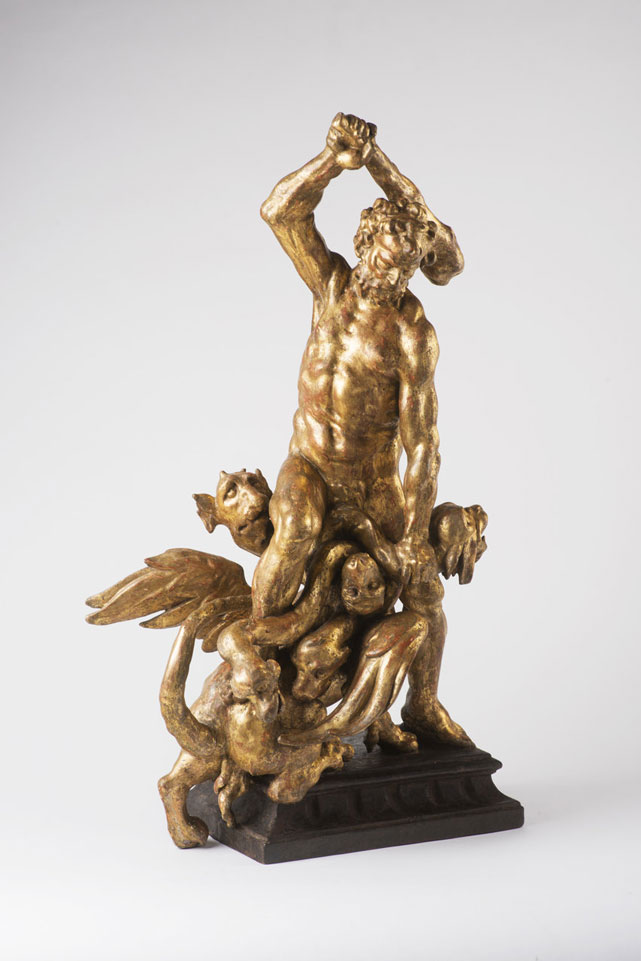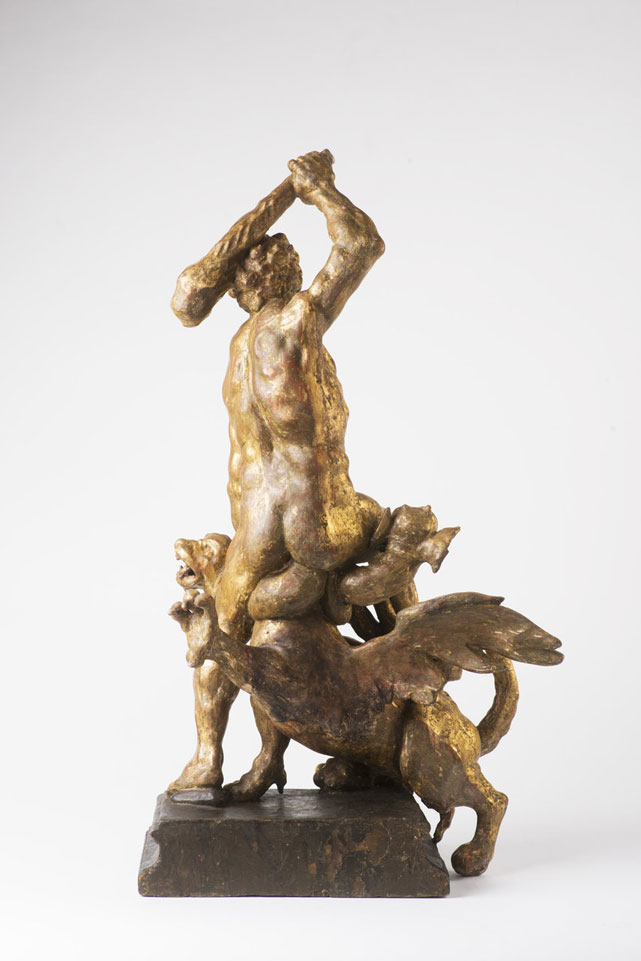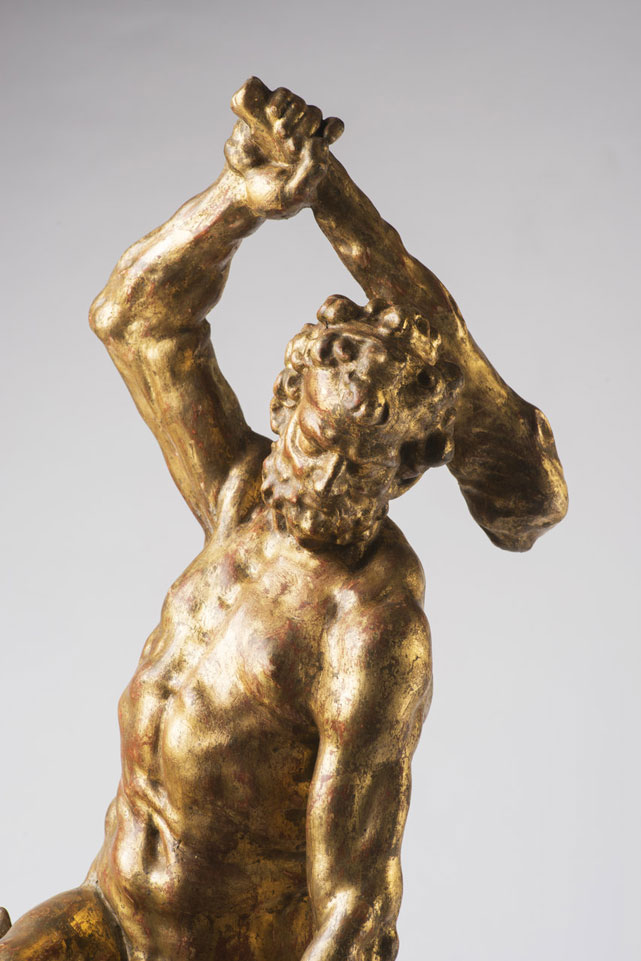21
LAZAR WIDEMANN (1697-1769): HERCULES FIGHTING WITH THE HYDRA Around 1750, Bohemia Lazar Widemann
Around 1750, Bohemia
Lazar Widemann is among the best High Baroque sculptors who lived and worked in Bohemia. The overwhelming majority of his work, commissions for the Counts of Vrtba, was created in western and central Bohemia. The family of counts even funded his attendance at Accademia del Disegno in Florence, where he learned to work in marble and alabaster. In addition to monumental sculptures used to decorate churches and palace facades, Widemann focused small genre sculptures. His marble statues portraying ancient mythical themes, which he started to work on following his return from Italy, are well-known. The sculpture on auction shows a clear similarity with his small marble and alabaster works; the closest is the sculpture of Saturn carrying away his children from the collections of the Los Angeles County Museum of Art. The model for Widemann was certainly a drawing by Jan Muller from around 1602 - Hercules killing the Hydra, which was created by the statue of Adrian de Vries from 1597. Hercules is depicted in mid-swing fighting with the sinuous hydra. The composition demonstrates strong dynamics and expressiveness, indicating the work was created during Widemann's prime around 1750.
Gilded and patinated wood. (Height 70,5 cm)
LAZAR WIDEMANN (1697-1769): HERKULES IM KAMPF MIT HYDRA /
Um 1750, Böhmen
Lazar Widemann zählte zu den besten in Böhmen arbeitenden Bildhauern des Hochbarock. Die überragende Mehrheit seiner Arbeiten entstand in West- und Mittelböhmen auf Bestellung der Grafen zu Vrtba. Auf ihre Kosten studierte der junge Widemann sogar an der Accademia del Disegno ve Florencii, wo er die Arbeit mit Marmor und Alabasta erlernte. Neben monumentalen Plastiken zur Schmückung von Kirchen und Palaisfassaden, widmete er sich der Schaffung kleiner Genre. Bekannt sind Marmorplastiken, die Themen aus antiken Legenden darstellen. Derartigen Arbeiten begann er sich zu widmen, nachdem er aus Italien zurückgekehrt war. Das vorgestellte Werk zeigt eine frapante Ähnlichkeit mit seinen feinen Marmor- und Alabastaarbeiten, am nächsten ist es jedoch der Statue der ihre Kinder wegziehenden Saturna aus der Sammlung des Country Museum of Art in Los Angeles. Herkules wird in heftiger Bewegung bei seinem Kampf mit der geschmeidigen Hydra dargestellt. Die Komposition birgt eine sehr starke Dynamik und Expressivität in sich, wodurch dieses Werk eindeutig dem Schaffenshöhepunkt des Autors zuzuordnen ist, der um das Jahr 1750 lag. Vergoldetes und patiniertes Holz. (H. 70,5 cm)
Around 1750, Bohemia
Lazar Widemann is among the best High Baroque sculptors who lived and worked in Bohemia. The overwhelming majority of his work, commissions for the Counts of Vrtba, was created in western and central Bohemia. The family of counts even funded his attendance at Accademia del Disegno in Florence, where he learned to work in marble and alabaster. In addition to monumental sculptures used to decorate churches and palace facades, Widemann focused small genre sculptures. His marble statues portraying ancient mythical themes, which he started to work on following his return from Italy, are well-known. The sculpture on auction shows a clear similarity with his small marble and alabaster works; the closest is the sculpture of Saturn carrying away his children from the collections of the Los Angeles County Museum of Art. The model for Widemann was certainly a drawing by Jan Muller from around 1602 - Hercules killing the Hydra, which was created by the statue of Adrian de Vries from 1597. Hercules is depicted in mid-swing fighting with the sinuous hydra. The composition demonstrates strong dynamics and expressiveness, indicating the work was created during Widemann's prime around 1750.
Gilded and patinated wood. (Height 70,5 cm)
LAZAR WIDEMANN (1697-1769): HERKULES IM KAMPF MIT HYDRA /
Um 1750, Böhmen
Lazar Widemann zählte zu den besten in Böhmen arbeitenden Bildhauern des Hochbarock. Die überragende Mehrheit seiner Arbeiten entstand in West- und Mittelböhmen auf Bestellung der Grafen zu Vrtba. Auf ihre Kosten studierte der junge Widemann sogar an der Accademia del Disegno ve Florencii, wo er die Arbeit mit Marmor und Alabasta erlernte. Neben monumentalen Plastiken zur Schmückung von Kirchen und Palaisfassaden, widmete er sich der Schaffung kleiner Genre. Bekannt sind Marmorplastiken, die Themen aus antiken Legenden darstellen. Derartigen Arbeiten begann er sich zu widmen, nachdem er aus Italien zurückgekehrt war. Das vorgestellte Werk zeigt eine frapante Ähnlichkeit mit seinen feinen Marmor- und Alabastaarbeiten, am nächsten ist es jedoch der Statue der ihre Kinder wegziehenden Saturna aus der Sammlung des Country Museum of Art in Los Angeles. Herkules wird in heftiger Bewegung bei seinem Kampf mit der geschmeidigen Hydra dargestellt. Die Komposition birgt eine sehr starke Dynamik und Expressivität in sich, wodurch dieses Werk eindeutig dem Schaffenshöhepunkt des Autors zuzuordnen ist, der um das Jahr 1750 lag. Vergoldetes und patiniertes Holz. (H. 70,5 cm)
EVENING AUCTION 2016
Sale Date(s)
Venue Address
For Arthouse Hejtmánek delivery information please telephone +420 776 210 002.
Important Information
WHERE
ARTHOUSE HEJTMÁNEK
Gallery and Auction house Ltd.
Goetheho 17/ 2
160 00 Prague 6
Czech Republic
WHEN
Preauction Exhibition: 18. – 30. 11. 2016 / 10.00 – 18.00
Auction: 1. 12. 2016: entry from 5 pm, start at 6 pm
REGISTRATION
You can register by filling out the registration form:
- ONLINE
- IN PERSON
You can register during the pre-auction exhibition 18.– 30. 11. 2016 with one of our employees - BY EMAIL
By filling out the registration form and sending it with a copy of your personal identification card or passport to email: ivana@arthousehejtmanek.cz or fax: +420 222 264 881
WHAT TO LOOK FORWARD TO
For our auction, we have carefully selected a varieaty of exceptional artistic works, antiquities and design.
You can look forward to the early work "BETWEEN SUNFLOWERS" by Otakar Kubín, interesting collectors acquisitions from Václav Brožík, Jan Preisler or Antonín Slavíček, Vlaho Bukovac, Josef Šíma, Václav Radimský, Franz Metzner or Jan Bauch. We will also auction works by present artists such as Karel Malich and Jan Saudek.
From the field of furniture we will represent Italian baroque, Czech cubism in the form of several items by Gočár, and also art deco with a glass case made by architect Mašek.
There will be certainly available many other surprising items that will touch and excite any collector.









